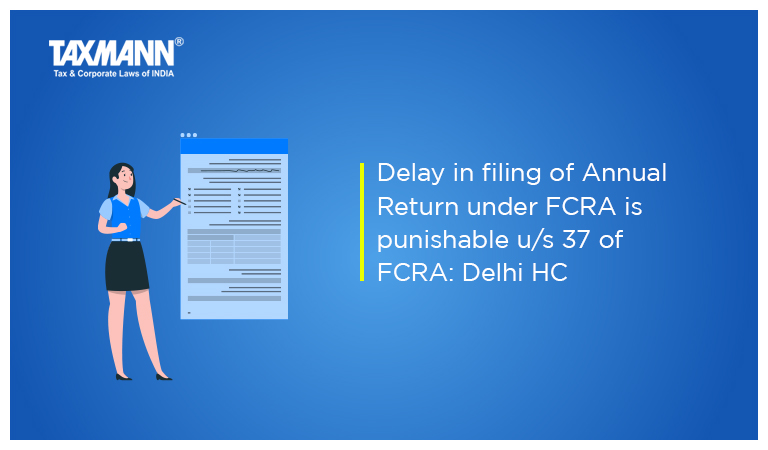Delay in filing of Annual Return under FCRA is punishable u/s 37 of FCRA: Delhi HC
- Blog|News|FEMA & Banking|
- 3 Min Read
- By Taxmann
- |
- Last Updated on 19 September, 2022

Case Details: Mizpah Charitable Trust v. Union of India - [2022] 142 taxmann.com 318 (HC-Delhi)
Judiciary and Counsel Details
-
- Vibhu Bakhru & Amit Mahajan, JJ.
- Manoj V. George, K.M. Vignesh Ram, Ms Shilpa Liza George & Ranjit V. Philip, Advs. for the Petitioner.
- Anil Soni & Rahul Mourya, Advs. for the Respondent.
Facts of the Case
In the instant case, the petitioner challenged notification no. S.O. 1070(E) dated 26.04.2013 issued by the respondent under Section 41 of the Foreign Contribution (Regulation) Act, 2010 (FCR Act). In addition to this, the petitioner challenged an order dated 12.03.2014 issued by the respondent, whereby the petitioner was advised to pay a penalty of Rs. 11,78,260/- for compounding the offence of delay in filing of the annual returns under the FCR Act for the financial years 2009-10, 2010-11 and 2011-12.
Questions placed before the High Court for consideration –
(a) Whether the impugned notification was violative of the provisions of the FCR Act
(b) Whether the delay in filing of the returns was an offence punishable under the FCR Act?
(c) Whether the impugned order to the extent it calls upon the petitioner to pay the penalty for a period prior to 01.05.2011 was sustainable?
Contentions of the Petitioner –
Firstly, the petitioner contended that the effect of the impugned notification no. S.O. 1070(E) was to treat the non-filing of the annual return as an offence. Thus, applying the impugned notification to cover a period prior to its issuance was unconstitutional. Therefore, it was liable to be set aside as ultra vires of the provisions of the FCR Act.
Secondly, the petitioner contended that Chapter VIII of the FCR Act contains provisions relating to ‘Offences and Penalties’ and there is no provision in the said chapter, which stipulates that the delay in filing an annual return is an offence. Since the delay in filing the annual return was not an offence, the question of compounding the same doesn’t arise.
High Court Held
(a) Section 41 of the FCR Act expressly provides that any offence, other than an offence, which is punishable by imprisonment only, made prior to the institution of any prosecution be compounded for such sums as the Central Government may specify.
The impugned notification has been issued by the Central Government in the exercise of powers under Section 41 of the FCR Act. It does not fall foul of any provision of the FCR Act. Thus, impugned notification was not ultra vires of provisions of the Act.
(b) The High Court observed that Rule 17(2) of the Foreign Contribution (Regulation) Rules, 2011 provides the manner in which an annual return is required to be filed. Therefore, the petitioner was required to file the annual returns within the prescribed period in compliance with the provisions of the FCR Act.
The heading of section 37 of the FCR Act “Penalty for offences where no separate punishment has been provided” cannot be relied upon to argue that provisions of Section 37 of the FCR Act would be applicable only in circumstances where an offence is specified under Chapter-VIII of the FCR Act but no punishment has been prescribed.
In view of the above, the contention that delay in filing the annual return under the FCR Act was not an offence, was thereby rejected.
(c) Failure to file annual returns in terms of Rule 17 of the FCR Rules prior to 01.05.2011 cannot be construed as an offence under the FCR Act. Clearly, the petitioner couldn’t be held guilty of an offence of not filing the returns under the FCR Act, prior to it coming into force.
Disclaimer: The content/information published on the website is only for general information of the user and shall not be construed as legal advice. While the Taxmann has exercised reasonable efforts to ensure the veracity of information/content published, Taxmann shall be under no liability in any manner whatsoever for incorrect information, if any.

Taxmann Publications has a dedicated in-house Research & Editorial Team. This team consists of a team of Chartered Accountants, Company Secretaries, and Lawyers. This team works under the guidance and supervision of editor-in-chief Mr Rakesh Bhargava.
The Research and Editorial Team is responsible for developing reliable and accurate content for the readers. The team follows the six-sigma approach to achieve the benchmark of zero error in its publications and research platforms. The team ensures that the following publication guidelines are thoroughly followed while developing the content:
- The statutory material is obtained only from the authorized and reliable sources
- All the latest developments in the judicial and legislative fields are covered
- Prepare the analytical write-ups on current, controversial, and important issues to help the readers to understand the concept and its implications
- Every content published by Taxmann is complete, accurate and lucid
- All evidence-based statements are supported with proper reference to Section, Circular No., Notification No. or citations
- The golden rules of grammar, style and consistency are thoroughly followed
- Font and size that’s easy to read and remain consistent across all imprint and digital publications are applied



 CA | CS | CMA
CA | CS | CMA
